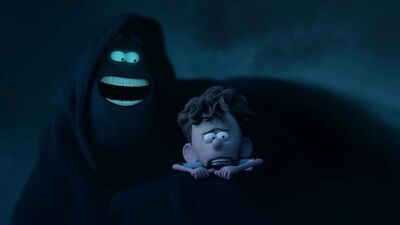One doesn’t need to know that “Orion and the Dark” was written by the man behind “Adaptation” and “Being John Malkovich” to sense that the script is a little left of center for a family film. It’s not every day one gets a David Foster Wallace or Saul Bass reference in a cartoon. And that’s just in the prologue. In that clever opening that’s nearly a short film of its own, Kaufman and director Sean Charmatz, making his debut, introduce viewers to Orion (Jacob Tremblay), an elementary school kid who’s afraid of just about everything. Bullies, bees, falling from skyscrapers—you name it, he’s thought about its terrifying nature. And the thing that he’s most afraid of is the common, evolutionary thing called the dark.
One night, after his supportive parents (Carla Gugino & Matt Dellapina) have tried to convince him that everything is safe, Orion meets the literal Dark, voiced wonderfully by the great Paul Walter Hauser, who gives a vocal performance that shifts beautifully from gregarious to vulnerable over the course of the film. His work here is a reminder of how much an actor can elevate an animated film when they don’t just see it as an easy assignment. He clearly considered the arc of something impossible, and made it work by grounding that arc in the relatable. What if the Dark was like Orion to an extent? He’s also afraid of being ignored and unneeded in the world. After all, everyone loves the Light (Ike Barinholtz), portrayed here as almost Superman to Dark’s Batman—more obviously heroic, and less naturally brooding.
The Dark decides that the best approach to getting Orion to stop fearing him is to basically pull a “Take Your Kid To Work Day,” zipping the protagonist around the globe to see how night works, introducing him to Sweet Dreams (Angela Bassett), Sleep (Natasia Demetriou of “What We Do in the Shadows”), Unexplained Noises (Golda Rosheuvel), Insomnia (Nat Faxon), and Quiet (Aparna Nancherla). Here’s where Charmetz’s production really starts to feel like “Inside Out”—these elements work together behind the scenes much like the emotions in that Pixar darling—but “Orion and the Dark” never succumbs to feeling like an echo. It carves out its own parallel lane instead of merely taking the same path.

